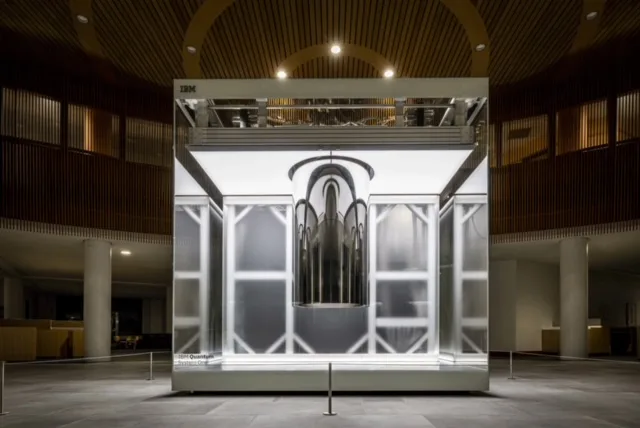Cleveland Clinic and IBM officially unveiled IBM Quantum System One at Cleveland Clinic, the first quantum computer in the world to be uniquely dedicated to healthcare research with an aim to help accelerate biomedical discoveries.
The unveiling comes as a key milestone in Cleveland Clinic’s and IBM’s 10-year Discovery Accelerator partnership, announced in 2021, which is focused on advancing the pace of biomedical research through the use of high-performance computing, artificial intelligence and quantum computing. The system was unveiled at a formal event today featuring leaders from IBM and Cleveland Clinic, Susan Monarez, Ph.D., Deputy Director, Advanced Research Projects Agency for Health (ARPA-H); Congresswoman Shontel Brown (OH-11); Lt. Governor of Ohio Jon Husted; and Mayor of Cleveland Justin M. Bibb.
Quantum computing is a rapidly emerging technology that harnesses the laws of quantum mechanics to solve problems that today’s most powerful supercomputers cannot practically solve. The ability to tap into these new computational spaces could help researchers identify new medicines and treatments more quickly.
A major milestone in quantum computing
“This is a pivotal milestone in our innovative partnership with IBM, as we explore new ways to apply the power of quantum computing to healthcare,” said Tom Mihaljevic, M.D., Cleveland Clinic CEO and President and Morton L. Mandel CEO Chair. “This technology holds tremendous promise in revolutionizing healthcare and expediting progress toward new cares, cures and solutions for patients. Quantum and other advanced computing technologies will help researchers tackle historic scientific bottlenecks and potentially find new treatments for patients with diseases like cancer, Alzheimer’s and diabetes.”
New Scientific Advancements in Biomedical research
“With the unveiling of IBM Quantum System One at Cleveland Clinic, their team of world-class researchers can now explore and uncover new scientific advancements in biomedical research,” said Arvind Krishna, IBM Chairman and CEO. “By combining the power of quantum computing, artificial intelligence and other next-generation technologies with Cleveland Clinic’s world-renowned leadership in healthcare and life sciences, we hope to ignite a new era of accelerated discovery.”
In addition to quantum computing, the Cleveland Clinic-IBM Discovery Accelerator draws upon a variety of IBM’s latest advancements in computing technologies, including high performance computing via the hybrid cloud and artificial intelligence.
Researchers from both organizations are collaborating closely on a robust portfolio of projects with these advanced technologies to generate and analyze massive amounts of data to enhance research.

lenetstan/shutterstock
Leveraging the latest in quantum computing
The Cleveland Clinic-IBM Discovery Accelerator has generated multiple projects that leverage the latest in quantum computing, AI and hybrid cloud to help expedite discoveries in biomedical research. These include:
- Development of quantum computing pipelines to screen and optimize drugs targeted to specific proteins;
- Improvement of a quantum-enhanced prediction model for cardiovascular risk following non-cardiac surgery; and
- Application of artificial intelligence to search genome sequencing findings and large drug-target databases to find effective, existing drugs that could help patients with Alzheimer’s and other diseases.
The Discovery Accelerator also serves as the technology foundation for Cleveland Clinic’s Global Center for Pathogen & Human Health Research, part of the Cleveland Innovation District. The center, supported by a $500 million investment from the State of Ohio, Jobs Ohio and Cleveland Clinic, brings together a team focused on studying, preparing and protecting against emerging pathogens and virus-related diseases. Through the Discovery Accelerator, researchers are leveraging advanced computational technology to expedite critical research into treatments and vaccines.
A significant part of the collaboration is a focus on educating the workforce of the future and creating jobs to grow the economy. An innovative educational curriculum is being designed for participants from high school to the professional level, offering training and certification programs in data science, machine learning and quantum computing to build the skilled workforce needed for cutting-edge computational research of the future.
Bottom line
Additionally, the two organizations are hosting research symposia, seminars and workshops intended for academia, industry, government and the public with a goal of building a critical mass of computing specialists in Cleveland.



![women [longevity live]](https://longevitylive.com/wp-content/uploads/2020/01/photo-of-women-walking-down-the-street-1116984-100x100.jpg)










